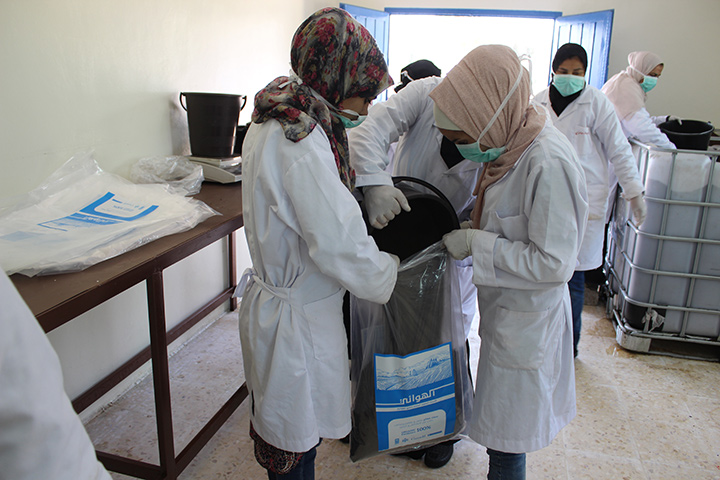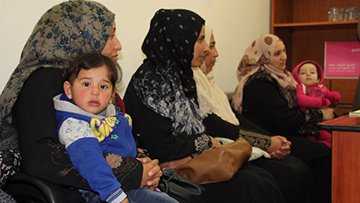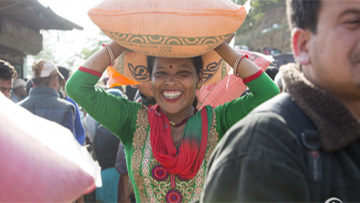Composting towards equality: Women join the workforce in Jordan

Low-income and refugee women are building confidence and gaining economic independence by working in a compost packaging facility.
Laughter and chatter fill the room as 16 Syrian, Jordanian and Iraqi women eat breakfast together every morning in the village of Khaldieh in northern Jordan.
They are the first women in their communities to work outside the home.
Using state-of-the-art machinery, these women package two tons of compost every day in a packaging facility entirely managed and operated by local women.
The facility focuses on women’s leadership and economic independence, all the while helping to relieve the demand placed on municipal solid waste management services from the influx of refugees in the region. It also promotes inclusion and acceptance between refugees and host communities.
The construction and operation of this composting plant at Al-Hussaineyyat Landfill is the result of an ongoing partnership between Canada, the United Nations Development Program, the Jordanian Ministry of Municipal Affairs and Future Pioneers for Empowering Communities, a local non-profit organization.
Challenging social norms

At first, many women were hesitant to participate.
It was not easy to get women to register to work with us in the facility. Their families were not supportive of their work and in some cases they were not allowed to join. But now, when women and their families see the financial benefit, we are getting more requests to join and have started a waiting list.
To promote women’s participation, the packaging facility is entirely women-run and hosted by the Khaldieh Society for Family and Childhood Care, which provides daycare services for young children.
To accommodate other responsibilities, women have flexible work hours based on performance, not number of hours. After a worker achieves her daily targets, she can leave. Women are empowered to manage their own time and deliver their daily targets effectively.
In some cases, women are now the main breadwinners of their families.
Gaining independence and economic security
As a Syrian mother of nine children who also cares for her ill husband, Suad knew that working in the compost facility would provide much needed income for her family.
Suad’s family and friends discouraged her from taking on additional duties outside the family. Despite the social pressure, Suad was determined to improve her family’s situation, so she enlisted. Flexible work hours let her manage family responsibilities. After earning her first paycheck, she was able to settle her three-month overdue rent.
Samira, a Jordanian mother, initially faced resistance from her husband. However, after a trial period, he now encourages her to work, not only for the income, but because he sees how it makes her happier and more confident.
My children see me differently now. I buy things and they realized that my work is beneficial for everyone.
Many women report that their relationships with their husbands and children have improved. Not only has their income eased financial burdens, but also by taking a more visible role in their families, women have earned more respect.
Building friendships over breakfast

Um Ward, the facility supervisor, is dedicated to helping women achieve their potential and claim their space within their families and community. She introduced team-building activities, like eating breakfast together, to encourage friendship and support among the women. The women can also contribute small amounts of money to go on trips or group lunches.
It is very important that women get together for breakfast every day to talk, laugh and support each other. We need to be there for each other as much as we need to get paid. [Breakfast] is a time we dedicate to ourselves.
Women from a variety of backgrounds help each other outside of the workplace through their social networks and connections.
With Jordanian, Syrian and Iraqi women eating and working side-by-side, understanding and acceptance between refugee and host communities is growing.
The work has strengthened my personality and self-reliance. I feel more responsible towards my family. It also increased my social relations and awareness of my surroundings and fellow women at work. I am engaging more with non-Jordanians as well.
With support from other women in the facility, women feel more self-confident and engaged with their diverse community.
Investing in women is not only the right thing to do, but the smart thing to do
Between 2015 and 2019, Canada has dedicated nearly $20 million to improve solid waste management and treatment in communities like Khaldieh, while prioritizing women’s involvement, decision-making and leadership at all levels.
Women and girls are at the heart of Canada’s Feminist International Assistance Policy.
When we invest in women, it sparks long-term sustainable economic growth, greater social equality and healthier communities. Promoting gender equality and empowering women and girls is the most effective way to eradicate poverty and build a more peaceful, more inclusive and more prosperous world.
As part of the 2030 Agenda for Sustainable Development, Canada will continue to speak up for the poorest and most vulnerable, especially women and girls, as we build a more equal world for everyone.
- Date modified:


